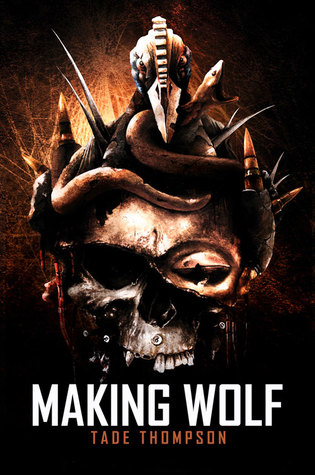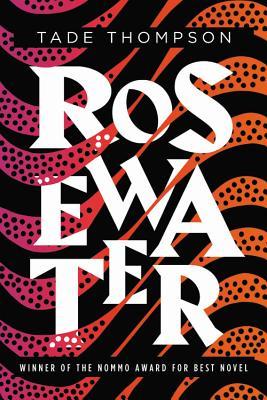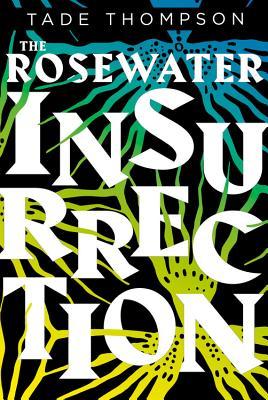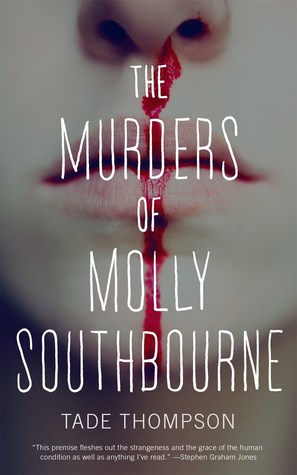Interview with Tade Thompson
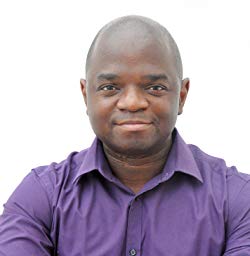
Tade Thompson is an exciting and vital voice in current genre fiction. His novel Rosewater (2016) is a bracingly original mix of cyberpunk and alien invasion story, which takes place in future Nigeria. Originally published by Apex in the US, it won the NOMMO Award and is now published by Orbit in the UK. His debut novel Making Wolf is an alternate history crime novel that won the Kitschies Golden Tentacle Award in 2015, and his novella The Murders Of Molly Southbourne has been optioned for TV.
Tade Thompson was at SFX Book Con 2 in Foyles this month and was kind enough to speak to The Fantasy Hive while he was there.
Your NOMMO Award winning Rosewater is out now in the UK from Orbit. Would you be able to tell us a bit about it?
Rosewater is the story of a very slow alien invasion, which the world is aware of, but not aware of how severe it is or how much it’s going to affect people. It follows the adventures of Kaaro, someone who has acquired abilities from that event. What those abilities are, what he uses them for and how it affects his life – in two periods of his life – that’s really what the book is about.
One of the things I found really interesting about it is the use of alien invasion as a metaphor for colonialism.
Yes, well, that was the main thing. It’s both about the actual colonisation and the neo-colonisation that’s happening now with people’s minds, where dominant Western cultures are overshadowing many of the less dominant cultures because it’s seen as successful. Therefore people copy the successful countries and their cultures. And I actually don’t think that alien invasions should just be about spaceships coming to Earth and space battles; they should have a meaning behind them, all the way back to The War Of The Worlds.
Which is also about colonialism…
Yeah, exactly. It’s like going back to what alien invasions were originally about, or what they were supposed to be.
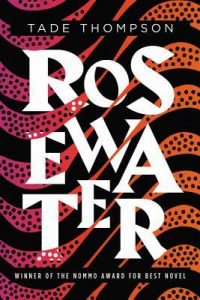
Rosewater uses cyberpunk tropes in an unfamiliar way. Was that a genre you particularly wanted to play with?
I want to play with all the genres and all the tropes, and I’m a superfan of science fiction. If I could write a gigantic 1000-page book – if anyone would let me get away with it – I would write a book where I put everything in it! But yes, big Philip K. Dick fan, big Neuromancer fan, Richard Morgan – everything to do with cyberpunk, I’ve always been interested in. Having a layer of reality that is based on a part that is not you, an infrastructure that is not you, and which you can project yourself into, it’s excellent. It’s a very rich playground for human beings to free themselves from whatever is holding them back in the physical world. So cyberpunk genre, yeah, there’s no way I was going to stay away from that.
The way you make the cyberpunk stuff work through fungal networks is really interesting.
Yeah, I have a background in networking. I worked with Cisco – this is going back in 2002, 2003. But every cyberpunk book uses technology, so I figured, well, what else can I use? I decided, well, let’s use something in biology, let’s use cells to create a network. So it’s more like replacing the cables and the network with biological things. If you substitute them for switches or for jacks, it would be the same.
There are quite strong horror elements as well, particularly the floater attack scene…
Like I said, I’m a horror guy as well. The thing with me is, I read everything. There is no subset of fantastical fiction that I’ve not read or that I’m not interested in, and horror was one of the first things that stimulated my wish to write. So that’s always been a part of me. But I also feel like horror should be in everything. If I ever write a romance book, there will be horror in it! I feel like horror is part of daily living; there’s horror in everyone’s life, so I’m not going to shy away from using horrific things in there. It will always happen. There’s also the meat palace [in Rosewater] which I thought was good!
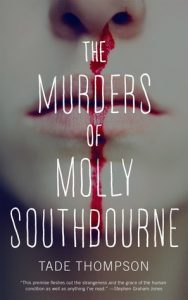 Your novella The Murders Of Molly Southbourne is more explicitly horror.
Your novella The Murders Of Molly Southbourne is more explicitly horror.
I was trying to write a nice family horror story. Its root is in a farmhouse in the English countryside. There’s a girl who, every time she bleeds, no matter what causes the bleeding, she grows copies of herself, and these copies then want to kill her. So her entire life is defending herself against her own self. I simply thought okay, look, what is the worst antagonist you could possibly have? And it will always be yourself. It’s kind of making the metaphor solid, making the metaphor physical. That’s what that was about. And I think I had a lot of fun with it.
And that’s been optioned now for TV…
It has. Well, they’re not sure if they want to make a TV show from it or a film, but they’ve optioned all of it, so that’s nice. I’m quite pleased with that. I don’t know how much I can talk about, but I think the safest thing I can say is that there’s interest in Rosewater as well. I can’t say any more at the moment.
Rosewater is actually your second novel, after Making Wolf…
Making Wolf is an alternate history and crime kind of mashup. It’s going to be reissued fairly soon, let’s put it that way. You’re probably the first to know that. And I’m probably in trouble for saying it, but I don’t care. There will be an announcement about it fairly soon. Right now it’s not actually on the market, you can only buy it second hand, but it’s coming back on the market soon.
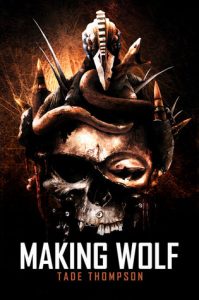 As well as winning the NOMMO for Rosewater you won the Kitschies for Making Wolf…
As well as winning the NOMMO for Rosewater you won the Kitschies for Making Wolf…
Yes, I won the Kistchies for Making Wolf and the NOMMO for Rosewater but also the NOMMO for Molly Southbourne. That was announced a few weeks ago. Murders Of Molly Southbourne was actually nominated for a number of things, like the British Fantasy Award, it just didn’t win anything. It was like the bridesmaid. Always the bridesmaid, never the bride, but people did really enjoy it.
Rosewater originally came out a couple of years ago with Apex.
Yes, it came out in the US with Apex, and they did a good job, but you know how it is: if you don’t have a publicity budget no one hears about it, which is basically what happened. But they did a very good job. I’m grateful to them, but it had to move on, it had a life that it had to live outside small press. That’s just how it is. And I’m happy for that. So the new one is a re-edit, it’s got more material, and it links more to books two and three.
So there are sequels coming?
Yeah, they are written. The first one is going to be out on the 19th of March 2019, that’s called The Rosewater Insurrection, and the final book in the trilogy is The Rosewater Redemption, and that should be out late next year, possibly around this time next year. But they’re all written and submitted. So if anyone’s afraid that, oh, he might never complete it, if he gets knocked down by a bus, that’s not going to happen. It’s already done. I’m not going to pull a George R. R. Martin!
Did you originally conceive Rosewater as book one of a trilogy?
I conceived it as one long narrative. I’m not saying that it’s going to end with the trilogy, that this is all there is now. There’s more to the story, but at this stage in my career, the clout I have is to get it at three books. After that, then I can discuss the further reaches of the story. There is more to it. I was thinking okay, look, I’m just going to write one gigantic book. I had these romantic notions of ‘let’s not do the whole trilogy thing, let’s write one big book once and for all.’ But when you write a book that’s 1000 pages long it becomes this thing that people say they’ve read and they never read. Jonathan Strange And Mr Norrell, for example. Many people talk about it, but lots of people haven’t actually read it. I happen to have read it because I like big books – like I said, I’m attached to those kind of things – but I realise that, first of all, you can’t carry it on the tube. Well, unless you read it on an e-reader. But if you carry the actual book, and I like physical books, it’s like… I read it when I was on holiday, I couldn’t read it as part of my normal day to day reading. It’s like War And Peace; it then becomes this thing that you have to complete, as opposed to ‘I want to just read a book.’ So I suppose I had to come round to the way of thinking about trilogies.
They do have their place.
They do. And for sci-fi and fantasy they are our bread and butter. But I remember young me, I would always find book two of everything. I would never find book one or three. I mean, it’s better now, but when I was a kid, you couldn’t find all of the books at once. It was odd.
You also wrote Gnaw as part of Five Stories High, which was a really interesting project with a lot of other great writers.
It was a horror anthology for Solaris, and Jonathan Oliver was the editor of that. I was really pleased to be invited to that, it was a great experience. We didn’t all collaborate on the stories, we just wanted to know okay, well, where will you be, what time era. ‘Cause we were just given ‘this house exists in some kind of nexus, you can do whatever you want.’ The very first thing I did was demolish the whole thing and then said okay, fine, a couple will buy it and then rebuild it. That’s going to be how I’ll do it. I really like that novella, actually. It was going back to really old ghost stories, and I tried to put in a lot of things I encountered when I was young: musical things, kids, slow worms. One of the things that always used to really frighten me as a kid was slow worms because I thought slow worms were snakes. So I put all of that in there, and I liked how that turned out.
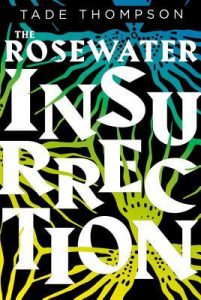 Music recurs throughout a lot of your work. In Rosewater you have Kaaro listening to jazz and old soul records.
Music recurs throughout a lot of your work. In Rosewater you have Kaaro listening to jazz and old soul records.
Well, I write with music, I listen to music a lot, and you’re influenced when you’re growing up. There was always music around. So it is not possible for me to do anything creative without music being involved. And that obviously filters into the work. Sometimes, I will listen to particular things to give a particular flavour to a scene, even if I don’t mention it, but the structure and the sound of the music will filter into whatever I’m writing. For example, there’s a song called Spybreak by the Propellerheads, which was used in the soundtrack of The Matrix – you know, in the original film, when Neo and Trinity were going into military facility with guns to try to rescue Morpheus. That was the song that was playing at the ground floor of that building, so whenever I want to write an action scene I play that, cause it puts me in that headspace. Once I put that on, it puts me in the moment. I don’t even need to listen to the whole song, just as soon as I start it then it kind of works that way.
The next two Rosewater books are coming out next year, so what are you working on at the moment?
It’s what I can talk about and what I can’t talk about. I’m actually writing a fantasy novel right now. That’s what I’m working on. I’m in the process of drafting it. I don’t know if I can say more about that just yet. You know what I have for next year, but I also have a follow up to Molly Southbourne coming out next year as well. This fantasy book will probably come out in 2020, depending on how much I can get done by then. So that’s what I’m working on. I’m doing some short stories, but just as palette cleansers. After you finish a book you need to come down from it, so I was coming down from doing the third book of Rosewater and I thought I’d write some short stories just to clear the mind.
Thank you Tade Thompson for speaking with us!
Tade Thompson is the NOMMO Award-winning author of the ROSEWATER series, MAKING WOLF, and THE MURDERS OF MOLLY SOUTHBOURNE.

